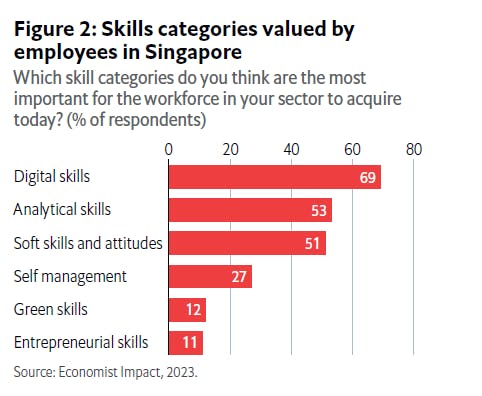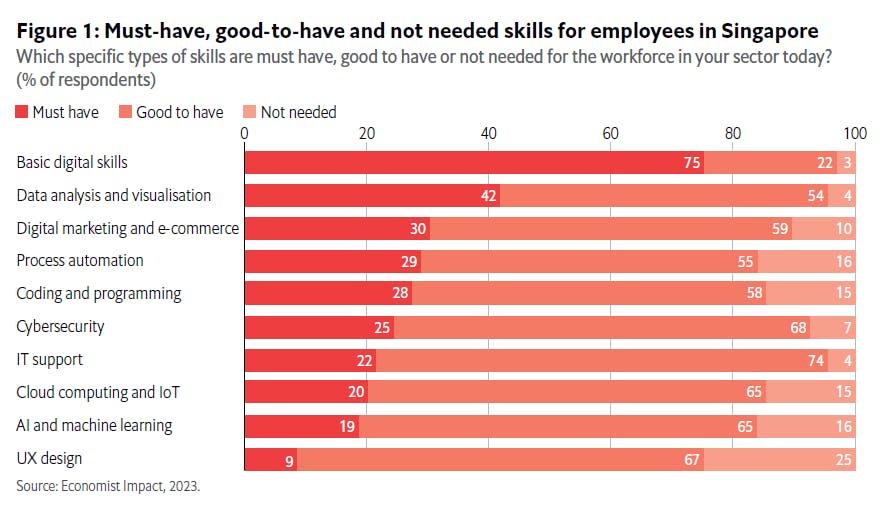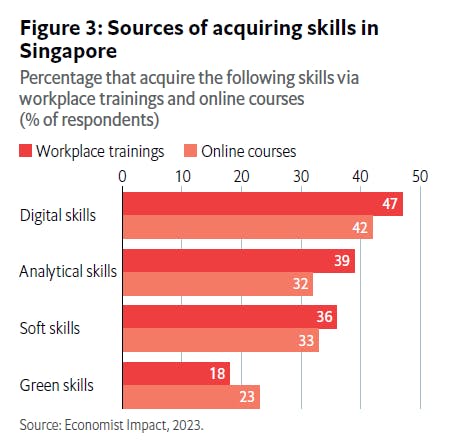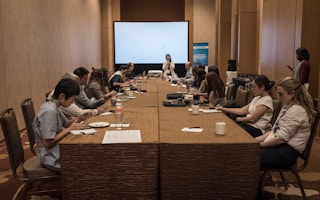Singapore workers view green skills as being much less valued by employers than digital skills and analytical skills, a study revealed.
To continue reading, subscribe to Eco‑Business.
There's something for everyone. We offer a range of subscription plans.
- Access our stories and receive our Insights Weekly newsletter with the free EB Member plan.
- Unlock unlimited access to our content and archive with EB Circle.
- Publish your content with EB Premium.
Of the top six skills that employees in Singapore thought to be valued by employers, green skills came in a distant fifth (12 per cent), after digital skills (69 per cent), analytical skills (53 per cent), soft skills and attitudes (51 per cent) and self management (27 per cent).
Green skills are those related to jobs in a sustainable economy, defined by the United National Industrial Development Organisation as “the knowledge, abilities, values and attitudes needed to live in, develop and support a sustainable and resource-efficient society”.
The results of the survey show a disconnect between employees’ perception and the city-state’s economic needs, as Singapore looks to strengthen its focus on the green economy over the coming decade. In 2020, the Singapore government estimated that the city-state will create 55,000 jobs in its focus on sustainable development, requiring green skills in sectors including finance, agriculture, food, urban solutions such as sanitation and waste management, carbon services, and climate science, said the study published by Economist Impact, and supported by Google.

Singaporean workers see green skills of lower value to employers as compared to other skills such as digital, analytical and soft skills. Image: Economist Impact.
Singapore’s Green Plan 2030, which is a whole-of-nation movement to advance Singapore’s national agenda on sustainable development, comprises of five pillars from which many of the new roles will emerge as more companies focus on them: a city in nature; energy reset; sustainable living; green economy; and a resilient future.
Digital skills perceived as most valuable
The findings of the study were based on a survey conducted of 1,375 employees across Asia Pacific (APAC) between November 2022 and January 2023, and included 100 employees from Singapore. Survey respondents were drawn from 14 markets across APAC.
Only 12 per cent of Singapore employees view green skills as important, compared with an average of 17.7 per cent in the Asia Pacific region.
Basic digital skills were seen as must-have by 75 per cent of employees in Singapore. The state has pushed for digital transformation with major governmental policies such as the Smart Nation initiative.

Digital skills are seen by Singapore workers as critical in today’s increasingly digitalised economy. Image: Economist Impact.
Even with government subsidies such as SkillsFuture and EnterpriseSG grants, a significantly lower number of employees in Singapore are motivated to pick up green skills compared to its regional neighbours: Philippines (28 per cent); Indonesia (33 per cent), Malaysia (33 per cent), Thailand (21 per cent) and Vietnam (21 per cent).
Soon Joo Gog, chief skills officer at SkillsFuture, said in response to the survey results that while digital skills are pervasive across industries and job roles because of enabling technologies that augment human activities, the momentum of green activities across industries are picking up, and eventually all jobs will require some level of green skills.
Most green upskilling in Singapore is currently driven by employees’ personal interest in the topic (26 per cent), revealed the survey – a trend that is expected to change as Singapore prioritises environmental goals.
‘No time to train’
Almost half (49 per cent) of Singapore respondents to the survey reported not having a good idea of which skills are in demand in the job market. They cited the lack of time to learn new skills (42 per cent) due to long working hours and caregiving responsibilities as the main reason for not upskilling.
Small and medium-sized enterprises (SMEs), which comprise 99 per cent of all Singapore companies and 71 per cent of the workforce, face more problems than multinational corporations (MNCs) in finding upskilling resources due to their limited resources and training capabilities.

Workplace training and online courses are the main places where Singapore workers acquire skills. Image: Economist Impact.
Employees who have received training list workplace training and online courses as major sources of skills attainment.
Workers in Singapore rely on their employers to provide information on different skills (64 per cent), support their mental well-being (51 per cent) and provide notable recognition through certification and additional perks (48 per cent).
Survey respondents said that government awareness programmes (61 per cent) are the main source of skills information, significantly higher than the regional average (42.5 per cent). To increase the rate of upskilling, governments can keep SMEs updated about upskilling courses and subsidies when they are available.
“To realise Singapore’s vision of a thriving digital and green economy, we need to push for continuous skills development,” said Ben King, managing director at Google Singapore.
“We believe it is important that everyone has the chance to acquire the necessary knowledge and expertise in their respective fields and it starts with providing inclusive, accessible upskilling opportunities. As the majority of employees in Singapore rely on government awareness programs as their primary source of information, strategic public-private partnerships can cultivate greater awareness of upskilling initiatives and reach the wider community,” said King.

















